Iran Vice President Describes Corruption As Domestic Sanctions
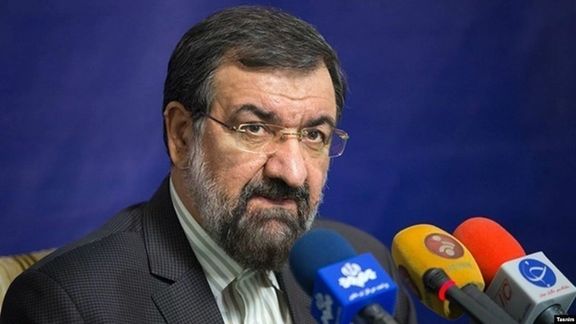
Iran’s vice president for economic affairs says there are many domestic problems that are hindering the country’s progress more than the Western sanctions.

Iran’s vice president for economic affairs says there are many domestic problems that are hindering the country’s progress more than the Western sanctions.
On the sidelines of an exhibition titled Achievements and Capabilities of the Jihadi Management on Sunday, Mohsen Rezaei told reporters that the biggest obstacles the economy faces are not imposed from the outside but stem from the internal problems, which he called “domestic sanctions.”
Rezaei described cumbersome and bureaucratic regulations, contradictory and inefficient laws and corruption in the country’s administrative system as the domestic sanctions that are “10 times more detrimental” to Iran’s businesses and industries.
He noted that economic reforms are the only way to get past these hindrances, adding that the current administration has started with trade reforms and then will pursue monetary reforms.
Rezaei added that the people should not feel the pressures of government’s budget deficit while they are also suffering from high tax rates as well as inflation.
The long process to get government permits to do business, lack of a good legal framework in the country, and unfair taxation are the main elements leading to unfavorable conditions in the country’s production sector.
Iran faces serious problems in three major indicators: Economic growth, the rate of inflation and the unemployment rate.
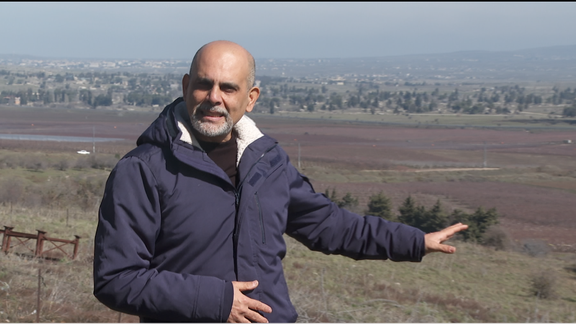
Iran bought large tracts of land close to the Syrian Israeli border in recent years and is settling Shiites to threaten Israel, Iran International has learned.
Taking advantage of a destructive civil war in Syria and the ensuing poverty, as well as migrations, Tehran has launched a plan to settle Shiites next to Israel’s northern border, Iran International’s correspondent in Israel reported.
The plan is to settle as many Iranian, Lebanese, Afghan and other Shiites as possible in towns and villages around the Golan Heights. Two areas in particular are Sa’sa and Qarfa where the Revolutionary Guard (IRGC) has enticed loyal Shiites to settle. Many young people in these areas, very close to Israel, are now members of Iranian-backed militia groups, such as Hezbollah or the Afghan Fatemiyoun Brigade.
These forces have been fighting under IRGC command for almost a decade in Syria to keep Bashar al-Assad in power, and when the war turned against rebels, the Iranian military moved closer to the Israeli border.
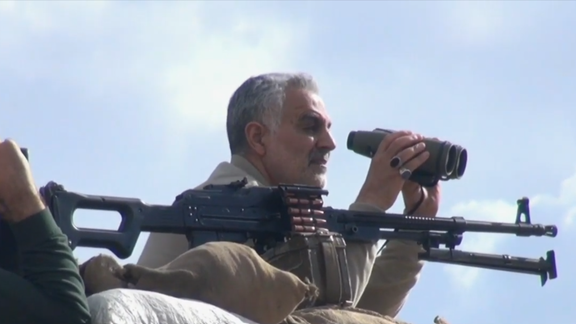
The United States and Israel in 2017 began putting pressure on Russia, that wields a lot of influence in Syria, to force Iranians to withdraw from the border, and there was talk of a 20–40-kilometer zone free of Tehran militias. But according to information available to Iran International, the arrangement was never fully implemented.
The Lebanese Hezbollah’s Southern and Golan commands are now well-established in the area, in addition to IRGC’s Qods (Quds) Force unit 840.
Settling Shiites near the Israeli border could be a long-term plan by Iran to prevent any such deals between Russia, the US and Israel to have any real impact. Tehran can always argue that it has no military presence in the area, while Shiite settlers would in fact be fighting forces anytime Iran wants to stir up trouble.
The situation on the ground can easily turn into what exists in Southern Lebanon, where an indigenous Shiite population lives, dominated by Hezbollah and facing Israel, which poses a serious threat.
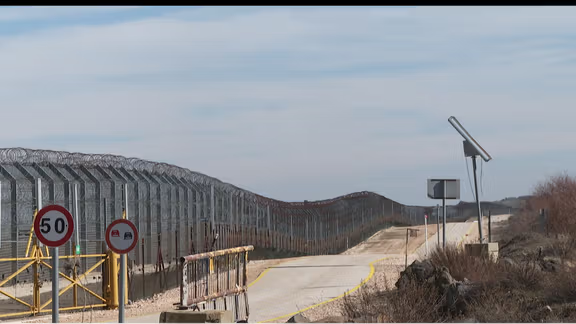
Our information also indicates that the Qods forced some Syrians living near Israel to place explosives next to the border security wall to injure or kill Israeli troops, in exchange for $20 for each improvised device.
It is not exactly clear how many settlers Iran has succeeded to bring to the area, but sources say they number in a few thousand.
Israeli sources say that it is Iran’s “dream” to create a threat belt against Israel in Syria, but so far, they claim the cost has been coffins returning to Tehran. Israel has conducted hundreds of air strikes against Iranian bases and weapons depots in Syria, with post-attack reports indicating that at least a few IRGC personnel were killed in each strike.
Israeli sources also say that they have more “surprises” in store for Iranian forces and believe that Qasem Soleimani’s killing by the United States in 2020 played an important role in slowing down Iran’s projects in Syria.
Amid these developments and tensions, the position of Bashar al-Assad is not clear. He has been trying to improve his ties with wealthy Arab states to secure needed financial assistance for rebuilding his devastated country. For him it is crucial to secure his hold over the country and appease the bitterly divided population with reconstruction. Iran’s adventures will harm this objective, but Assad might not be in a position at this time to stop his Shiite saviors unless Russia decides that Iranians should leave Syria.
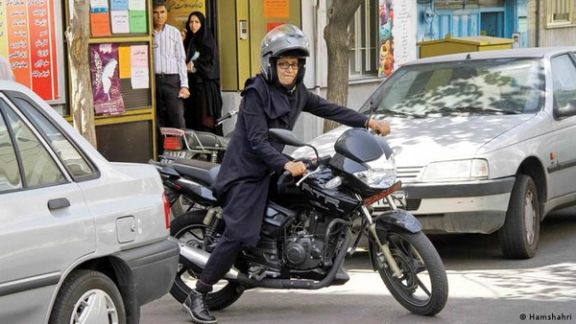
Iran intends “to organize and regulate” the use of motorcycles in Tehran and will “seriously deal” with those who have no motorcycle license, such as women.
Tehran’s Police Chief Brigadier General Hossein Rahimi announced the scheme on Sunday, saying that as of February 19, about 100 checkpoints will be set up across the city so no one can ride motorcycles in Tehran without a license.
The plan seems like a pretext to crack down on women who have been increasingly using motorbikes although it is frowned upon by the country’s hardliners while they are not even allowed to get driving licenses for motorcycles.
Law enforcement officials say riding motorbikes is illegal for women because according to law only men can apply for such licenses. They say any change in the regulations should be made in the parliament.
The country’s fundamentalists have also repeatedly expressed opposition to women riding bicycles, let alone motorcycles.
In 2017, Iranian media reported that two young women had been detained in Dezful in southwestern Iran after they were filmed riding a motorcycle.
In the same year, a female-only motorcycle track opened outside the capital as women have been allowed to practice on private circuits.

A report says Israeli intelligence agency Mossad has helped foil 12 plots to carry out terror attacks on Israelis in Turkey over the past 2 years.
According to Israeli Channel 12 news Saturday, most of the attacks had been planned by the Islamic State terror group but some of the thwarted schemes were reported to be Iranian operations.
It is not clear why Ankara suddenly became active in uncovering plots against Israel and networks working for Iranian intelligence. Turkey has recently signaled a desire to improve ties with Israel.
The report came a day after Turkish media announced the uncovering of an Iranian plot to assassinate Turkish-based Israeli businessman Yair Geller.
The Iranian spy cell was comprised of nine operatives, some Iranian and some Turkish, who planned to kill the Istanbul-based tycoon, who owns an engineering company specializing in aerospace and defense technology.
The hit was planned as a retaliation for the killing of Mohsen Fakhrizadeh, who was known as the "father of Iran's nuclear weapons program" and was assassinated outside Tehran on November 26, 2020, in an operation widely attributed to Mossad.
Turkish media reported Wednesday that the country’s intelligence had arrested 17 people allegedly linked to Iranian intelligence who were planning to kidnap an Iranian dissident.
The failed plot followed recent reports in Turkey of the indictment of 16 people including Palestinians and Syrian nationals arrested last October would be put on trial in Istanbul for "political and military" espionage for Israel.
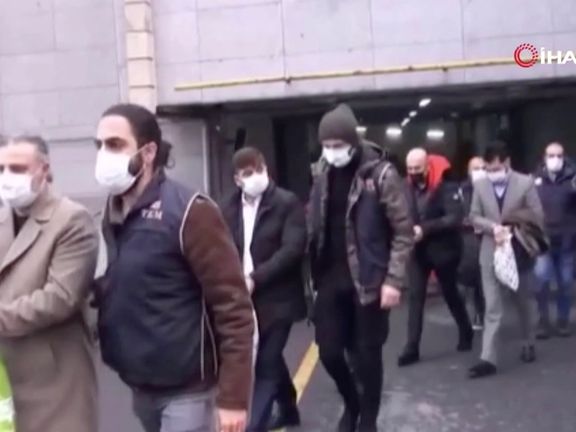
Turkey's intelligence (MIT) Friday supplied local media details of its detention of 14 Iranians and Turks it says were involved in kidnapping Iranians.
Footage shown by Turkish media Friday included arrests, searches of suspects' homes, and female suspects transferred by armed security forces.
The Turkish media also released some details of the persons involved in the alleged kidnapping ring. They claimed the leaders were two Iranian intelligence officers, named as Seyed-Mehdi Hossein and Ali Ghahraman-Hajiabad, although these were not among the two Iranians and 12 Turks arrested.
Turkey's OdaTV, a news website, last week reported that Ghahraman-Hajiabad was an Iranian intelligence office who had ‘masterminded’ a plan to kidnap an Iranian wanted by the Iranian intelligence service in Zonguldak, a city in Turkey’s Black Sea region. OdaTV put the number of arrests as 11.
Turkey's official Anadolou (Anatolia) news agency Friday relayed information from Turkish intelligence that an Iranian national among the detainees, whom it named as Morteza Soltan-Sanjari, had worked for Ihsan Saglam, a Turkish national who owns By Saglam defense company.
The report alleged that one of the Iranian intelligence officers had offered $1 million to Soltan-Sanjari and Saglam for the capture of ‘MR,’ an Iranian naval officer who had deserted. Hakan Saglam, another member of the alleged plot, had located MR and promised to smuggle him to the United States.
But the report also said the 14 kidnappers were paid $150,000 for each operation. It named
Yaghoub Hafez, an Iranian colonel, as someone successfully rendered to Tehran.
Anadolou alleged that Ihsan Saglam had tortured the person who later smuggled Hafez out of Turkey to force them to locate the colonel in Denizli province, western Turkey. Hafez was told that he was wanted by Iran, could be smuggled though Iraq to a “safe country,” but was then instead taken in February 2019 back to Iran.
Failed Plans
CNN Turk Friday said the kidnapping ring later collapsed when Turkish authorities found out that Soltan-Sanjari and Saglam and were planning to abduct “Iranian dissidents.”
In a different case, Turkey's Sabah Daily reported Friday that MIT had arrested eight Turks and Iranians over a failed Iranian plot to assassinate an Israeli businessman, Yair Geller, in Istanbul, in retaliation for the United States killing of Iranian general Qasem Soleimani in Baghdad in January 2020.
It is unclear when or whether any of these cases will reach courts. The Stockholm Center for Freedom in its 2021 report for Turkeywrote that Turkish courts “systematically accept bogus indictments, [and] detain and convict without compelling evidence of criminal activity...”
Turkey’s relations with Iran, despite trade continuing at around $10 billion in the face of US ‘maximum pressure’ sanctions, have been strained over Ankara’s support for Azerbaijan in the 2020 war with Armenia, and by Turkey’s support for militant Islamists in Syria opposing President Bashar al-Assad, an Iranian ally.
At the same time Turkey has also detained and put on trial16 individuals of different nationalities on charges of “political and military” espionage for Israel.
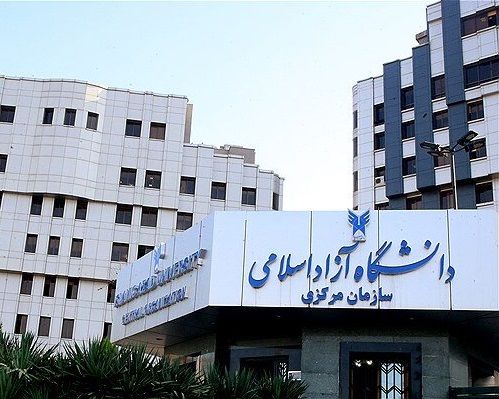
Iran’s Azad University has fired 325 professors and lecturers in recent months and has decided now to dismiss 1,500 more, Iran International TV reported.
According to information received by the station, about 40 of the professors were from the southwestern province of Kurdistan while more professors were fired in provinces with substantial religious and ethnic minorities. The university has dozens of campuses around the country.
The former head of the recruitment board at the Islamic Azad University, who resigned in September wrote in his resignation letter that about 1,800 people were referred to the authorities for severance pay, and 325 were let go.
While many critics see the layoffs as further political cleansing of academia that has accelerated since Ebrahim Raisi took office, others point to the decrease in the number of university applicants in general because of the existing economic crisis and high inflation that has impoverished the middle classes.
However, in January other Iranian universities fired three distinguished professors in what was clearly seen as apolitical move against independent academic figures.
The Islamic Republic has conducted several ‘cleansing’ operations in universities, firing professors that it has deemed not committed to the regime. The most widespread firings took place right after the 1979 revolution and repeated during the presidency of Mahmoud Ahmadinejad, who forced many professors into retirement.